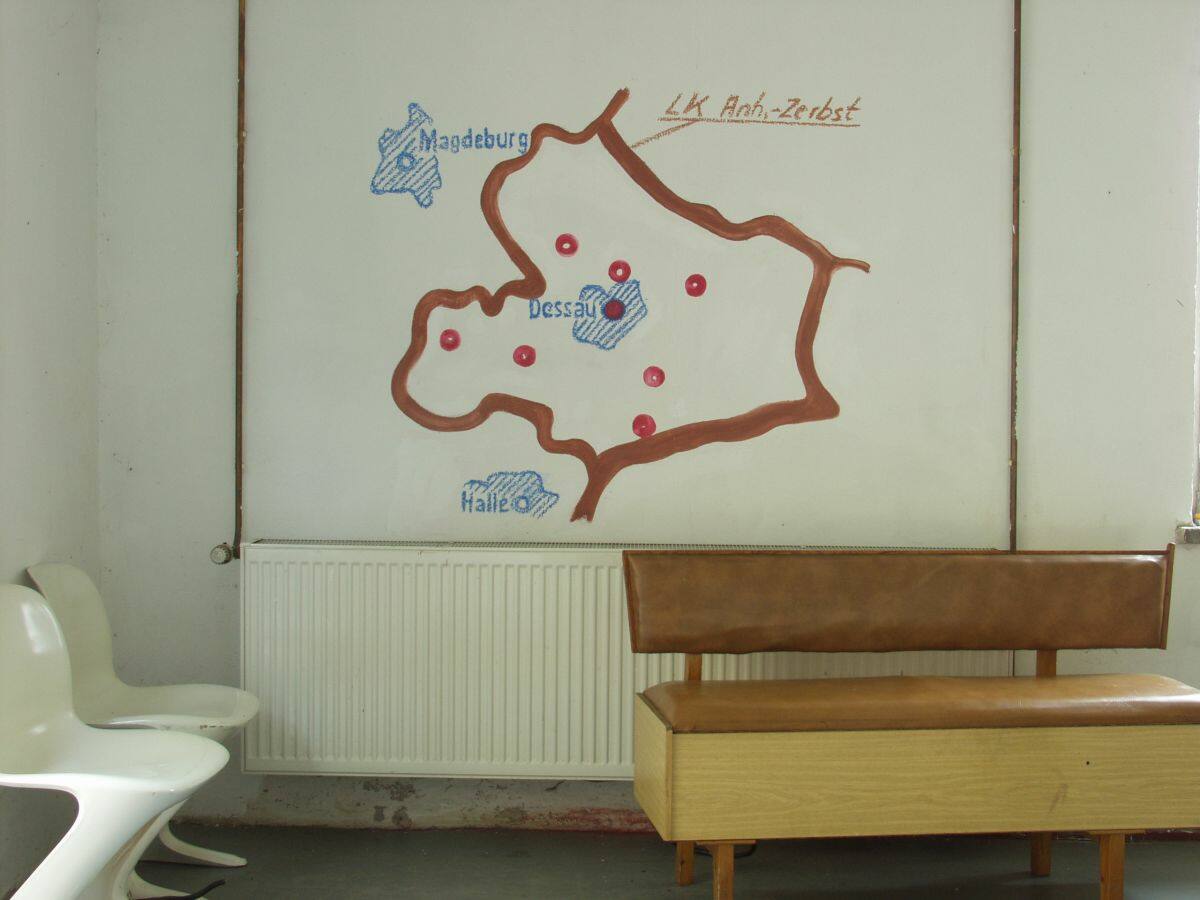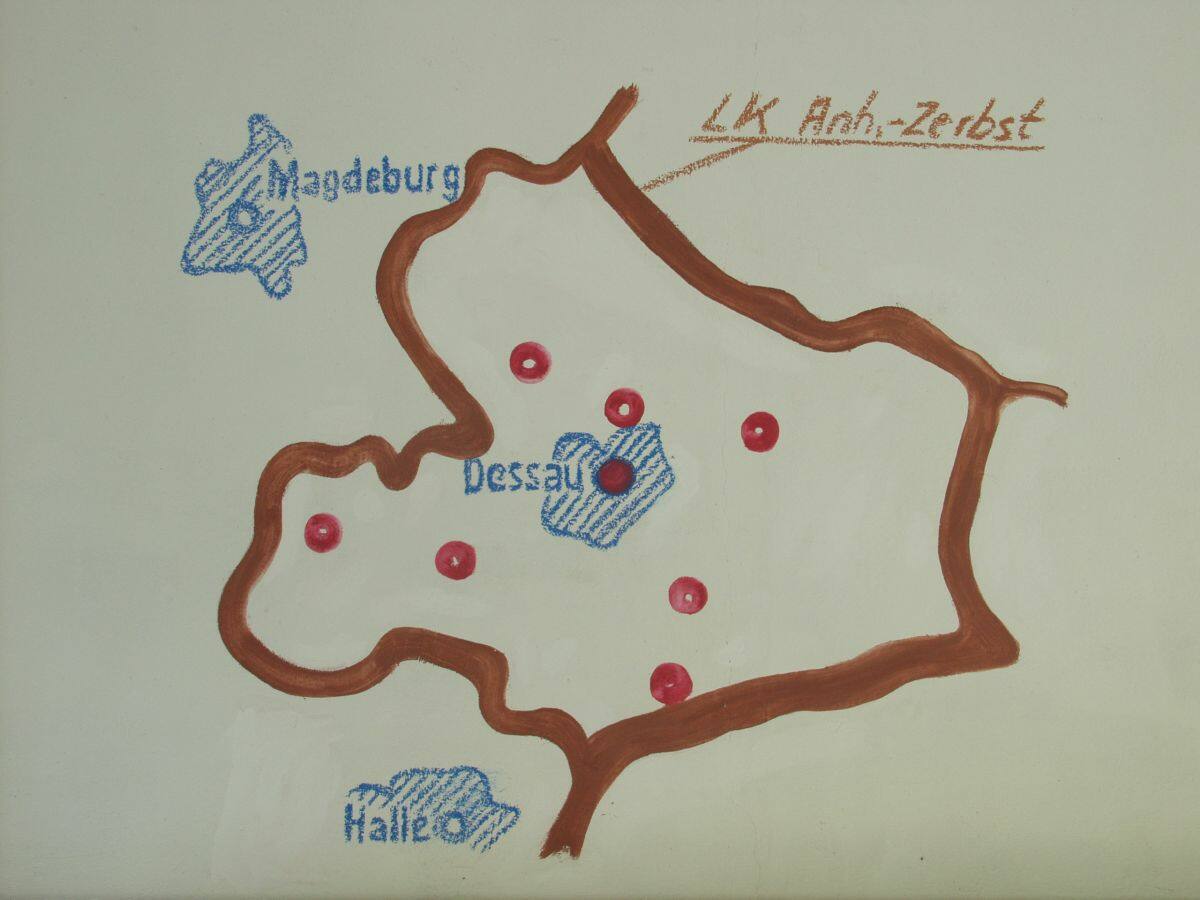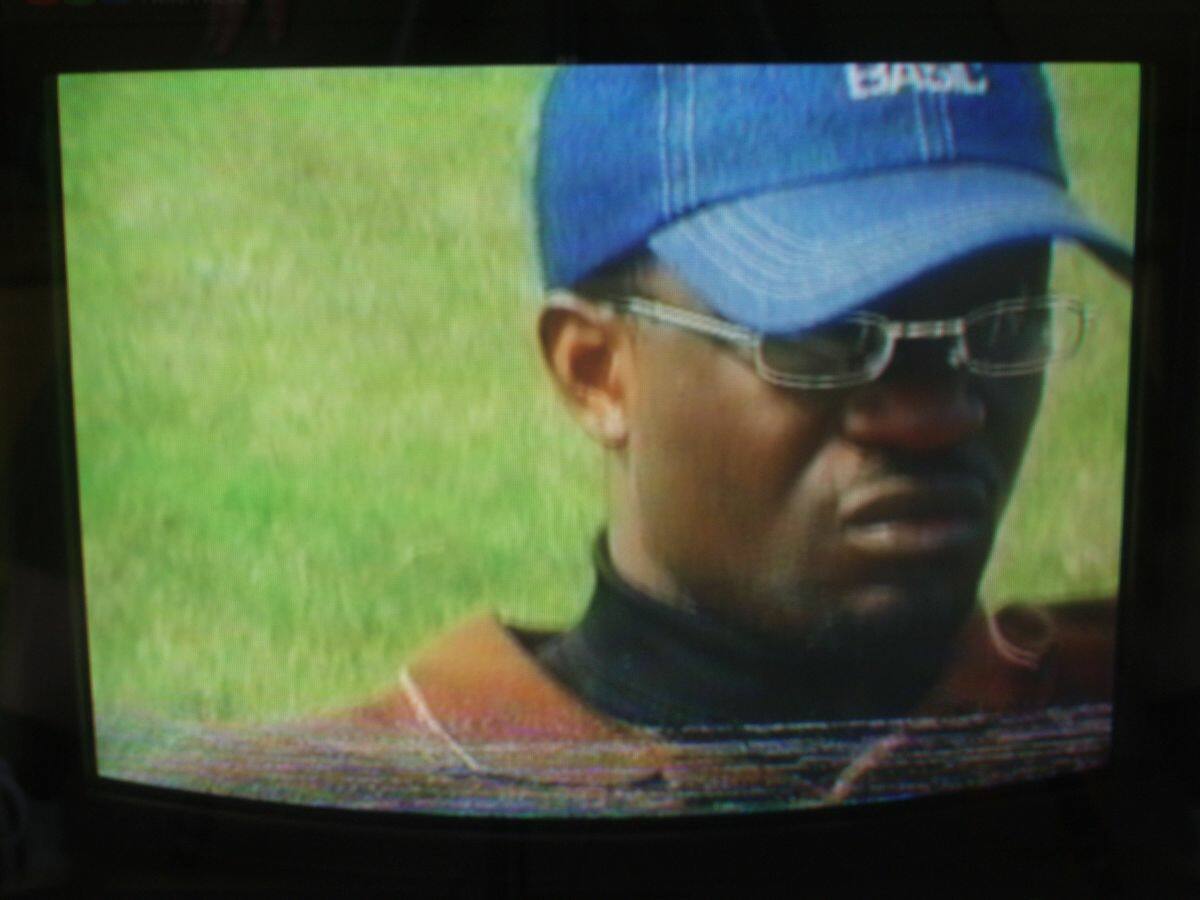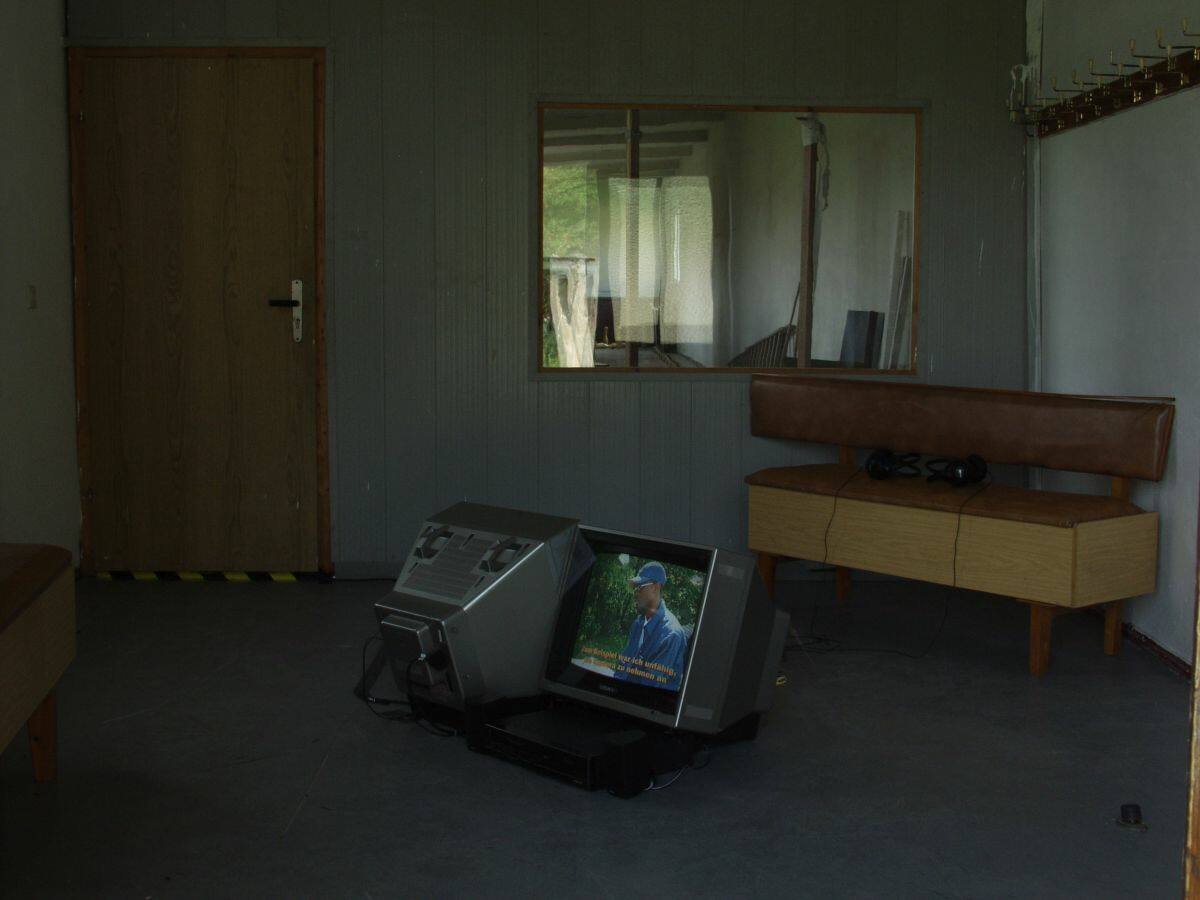Übergordnete Werke und Veranstaltungen
Rien ne vaut que la vie, mais la vie même ne vaut rien - bricoler la vie au quotidien
Personen
Media
"Nothing is like life, but life itself is nothing" - crafting everyday life
My story starts with Tuesday, the sixth of November in Düsseldorf. Of the hundred asylum applicants crowding together in front of the office, I am the second in line. First, I have to fill out a form about my identity, and then I am assigned a code number. Whenever my code number comes up on the electric display, I have to go into a small office.
In the first office, I am asked to give the reason for my asylum application; I am called into a second office for photos, and into a third for fingerprints. Finally, I find myself being directed toward a cash desk, where I am given the sum of seven marks, two tickets whose exact purpose is not very clear to me, and a map. I have two feelings: satisfaction that I am obviously not going to board a ship, as the other asylum applicants had predicted – the idea of living on a ship scared me; and for the first time, I touch the German marks. My second feeling is one of curiosity; I wonder where I am going if not onto a ship, and what these tickets and the money I have been given are for. When I meet up again with my fellow applicants, without any further support, we look at the map, and see “Halberstadt” circled. So we hit on the idea that Halberstadt is sure to be the next town, and that the tickets are meant for the train there. The beauty of the name Halberstadt starts me dreaming a little.
After this short digression, we have to think about the actual trip. Here, another problem arises, each of us has these two tickets and seven marks, but where should we start? We consult a German man, who, in contrast to the dozens of other people we have already approached, is ready to help us, and in halting English tries to describe the way we have to go. But we manage to understand one another – we have no choice – and he accompanies us to an underground station. He speaks with another German man, and from this conversation I guess that our helper is asking him where he is going, in case he can go with us and tell us when we have to get out. Our helper then informs us that the man is getting out at the railway station like us, and that he hopes we will manage there on our own. For the first time, I hear the word “Tschüss,” and after replying with “Tschüss” myself, I blindly follow the others.
In the underground, I don’t let the man under whose care our helper and friend has entrusted us out of my sight. About a half an hour later, we get out at a large station, and the man simply walks away without saying anything to us. What are we going to do in this huge railway station? What train should we take? I have never seen such a big railway station in my life. Once again, we discuss the matter for more than half an hour before deciding to make some inquiries. We approach the first black man who passes. He doesn’t know his way around any better than us, but he takes us to the information desk. Here, we are told that our train has already left and that we have to wait an hour for the next one. In addition to this information, we are handed a piece of paper with all the details of our journey on it. Now we realize that Halberstadt is not just around the corner; we have to travel six hours to get there. But in my imagination it is another beautiful city like Düsseldorf, because for me a country like Germany can only consist of big cities – and, what’s more, it’s not a ship. An hour later we are standing on the platform, ready to leave. Once we have boarded the train, we can relax. The question of how we go about changing trains remains. After more than oneand-a-half hours of travel, the train stops where we are to change. We have barely set foot on the ground when we see a second train at the station, and we get on it straightaway, without pausing for breath.
This is sure to be our train, I think to myself; the whites are organized people, and too polite to let people wait about for their connecting train. Later, when we are sitting on the train talking about it, it turns out that the others were thinking the same thing as me. We haven’t yet stopped savoring this thought when the train conductor appears. With a strange expression on his face, he asks us for our tickets, which we hold out to him with pride. It is an unpleasant surprise for us when he informs us – this time he is the one to look proud – that this is not our train, and that we have to get out at the next station. Instead of giving us the explanation we need, he starts threatening us. We hear the word “Polizei,” which sounds like the French word “police.” Now we understand that the situation is serious, and that the man is really furious. We get out the next time the train stops. The question now is what we are going to do.
Actually, I think, they aren’t all that friendly, the whites. But, why did this man behave like that? Do people still behave like that in countries where human rights are said to apply? We turn to the information desk once more. We are given different connections. This time we have to wait three hours. Hungry as we are, no one wants to risk spending their marks because we don’t know what they are meant for. After three hours a train comes. We get into it with some trepidation, as we still have painful memories of our previous experience. But when the conductor comes through, he contents himself with punching our tickets, something that both encourages and reassures us. We can all afford to have a little nap, as the trip will last another three hours. As for me, I can’t fall asleep. We arrive in Halberstadt at around eleven in the evening, and are lucky enough to meet a refugee at the train station. He says that the home is some distance away, and that we have to take a taxi. Now I understand why the money we were given in Düsseldorf is necessary.
After we have pooled our money, we get into the taxi. It is a rainy night at the start of winter. I strain to look out of the window so I can find out what sort of a city I have ended up in, but the darkness, the rain, and the speed of the car do not help me very much to get an idea. What I can guess, though, is that the area we are driving into is increasingly remote from the city. A few minutes later, I can see three large buildings in the distance; we arrive, and are met by three policemen, who take us into an office for another photo session. At this moment, I have only one desire: that someone will show me my room so I can sleep at last. Each of us is handed a bag containing bread, sardines, some keys, a spoon, a fork, and bed linen. Then we are accompanied to the infamous Transit Room No. 221 in Block A. This room is well known to the people in the camp, because all men spend their first night there. When get there, we decid to explore the building before we eat. I take a tour of the toilets, and see the unhealthy, decrepit sanitary facilities. And already here, I start asking myself several questions. I comfort myself a little by telling myself that this is only a transit camp, and that I will spend three weeks here at the most. But then I meet someone who has been here longer, who gives me a run-down on life in the camp and the city. I learn from him that a stay in Halberstadt is not always of a definite length, but can last from three weeks to three months, depending on each person’s luck. After taking in this sad picture drawn by someone more experienced than myself, we arrange to see one another the next morning. It is already one o’clock in the morning when I take leave of my acquaintance. I arrive back in my room, dejected; I have lost my appetite, and leave my meal untouched on the table.
I wake up with a start at seven o’clock, have a quick wash, and go and knock at the door of the man I was talking to the evening before, so he can help me deal with all the administrative formalities. He tells me it is too early and that the offices doesn’t open until nine. We go to the canteen to have breakfast. After breakfast I have to go to the Federal Office. I go through the process of answering a questionnaire, there is the umpteenth photo session, and I am handed a piece of green paper with my photo on it – I will find out later that it is called an “ID” – and another piece of white paper with the date of my application interview written on it: the fourteenth, a week later. Then my companion and I go to the social security office, where I am greeted with a demand to show my ID. I am told that my social security benefit will be 80 marks a month, plus a check for 15 marks to buy clothes. I am handed a key for the room I will share with two other people, and coupons for the canteen. Then it is time to go to the hospital for a medical examination. The whole procedure takes half a day. Afterwards, I go to my room to arrange my things and have a rest. In the evening, I go with my roommates to a party put on by some people who are to be transferred. In fact, there is a party every evening when the list of transferals is put up. We do not celebrate the parting, but the liberation. Completely contrary to what I thought at first, Halberstadt is home to a vast group of people who look back on the Hitler era with nostalgic yearning. In Halberstadt, I had my first racist experiences.
For example, an old man who speaks to me, and, when I approach him in a friendly fashion, says “nigger” to me and starts to cry, saying the name “Hitler.” And then there is the young African women looking for the hospital who asks some German women for directions; instead of helping, they let their dogs off the leash to keep this “nigger” at a distance. Racist actions are a part of the daily routine in Halberstadt. That’s how it is, too, when I go to my application interview a week after my arrival. From the start, I feel I have no chance. The contempt I am exposed to on the part of my questioner and his interpreter, together with their attempts at intimidation, throws me into a panic; I lose control of myself, and can’t manage to answer even the simplest questions; my sole thought is to answer as fast as possible and leave the room. For three hours I am made to look stupid by these two executioners, who think only of ways to hurt me, as if what I had experienced in my country was not enough. I come out haggard, weakened, and tired. One week later I receive the report and, of course, as I expected, the refusal of my asylum application. I am asked to leave the country within the next two months, or to appeal within the next two weeks. I ask myself two questions. First, how can I even leave the country? Where would I go? With what means? And, how do I appeal? I don’t have any money to hire a lawyer. Some of the more experienced people in the camp advise me to contact Caritas; that will only costs me three marks for photocopies, and six marks for stamps. I decide to do it.
The following week, as if the sky had brightened, my name appears on a list of transfers to Zerbst, scheduled for the next week. Three weeks in Halberstadt: that’s a brilliant achievement. I am treated as a hero. I positively soak up the admiration of the others. On the morning of the third of December, the big day has arrives. Because of the procedures required for my departure, I get up very early. When the bus leaves the camp at nine o’clock, among admiring looks from the others, I thank heaven that my prayers have been heard: at last I am leaving the prison. I am going to live in dignity in Zerbst. The three hours of the trip give me three hours to dream. I try to imagine my new life in a big city, among Germans, in the supermarkets and on the streets. The difference seems clear to me between Halberstadt, a life in the city of transition, and Zerbst, the city of residency. In Zerbst, there is sure to be real integration, because no one would send people to live in a xenophobic, racist city like Halberstadt. At certain moments, my thoughts turn to my fellow asylum-seekers who have remained in the hell of Halberstadt, while I am on my way towards entering a little paradise.
Deep into my dreams, I am awoken by my neighbor, who calls out in a cheerful voice: “My brother, we’re already almost home!” Like everyone else, I am eager to find out what my city of residence looks like; we all glue ourselves to the windows. The first surprise: Zerbst isn’t a city, but a village. But that doesn’t matter; as long as the people here are kind, that’s alright. The second surprise comes when we drive off the main road, past a cemetery and further and further into the forest. We arrive in a sort of yard where we see a small building standing forlorn in an open field. When the bus stops in front of this building, there are cries of despair – complete despondency reigns. But I continue to hope; it might be true that we would find ourselves just as isolated here as in Halberstadt, but perhaps the people here would be nice. Curious to quickly find this out, my fellow asylum-seekers and I hurriedly deposit our things in our rooms, and decide to go shopping. Flabbergasted by the 380 marks in social security benefit that we receive per month, we enter the first shop we come to. We barely notice the other people, as we are extremely busy comparing the prices here with those in Halberstadt. After I have finished doing this, I walk towards the check-out, taking out my mobile phone to check the time. Then, just as I am about to put it in my pocket again, a saleswoman appears and says she wants to search me. She is sure that I have concealed an article in my jacket. With everyone watching, she frisks me from head to toe.
Imploringly, I turn first to the Germans, hoping someone will intervene. But I encounter only looks of hate and contempt. Then I look at my companions. The women have tears in their eyes, and utter disappointment can be read in the faces of the men. Not only for my sake, but also for their own sake: it is all people with black skin who are being searched and humiliated here. The saleswoman lets me go after she finds nothing on me besides what I am holding in my hand. I go to the check-out to pay. I leave the shop, crying, because I have never suffered such a humiliation in my life before. Back at the camp, we talk about the problem with those who have been living there for some time, and they tell us about their fights with the Nazis. They say that Nazis have even come to light fires in the former camp building; the police accused the residents. A strange thing, in my opinion. I find it difficult to understand how someone would set fire to his house and then lie down to sleep in it – except, perhaps, if it was a suicide attempt – a reason I could understand in view of the racism of the local people. Every day when we Africans go into a shop, it becomes reason enough for putting a bodyguard on our heels to watch our every movement.
At the start of the year, the currency changes from marks to euros, and my social security benefit is now one hundred and ninety-eight euros and twenty-nine cents. With this money, I have to feed and clothe myself, send thirty euros a month to my lawyer, make phone calls – the nearest possibility to do so being more than three kilometers away from my camp on Boneschen Weg, at the camp on Ahronweg. Making phone calls is important for our inner well-being: speaking with members of our families who have remained in our native country. With the little money remaining, I decide to open a bank account, since I can’t go into the village disco ‘Jungle,’ because entrance is barred to black people. Here, too, I try all the banks without success. I content myself with living from day to day; I try to shorten my days by going to bed late and cunningly inventing illnesses so I can go to the doctor: it’s a way of occupying myself. Every day is like the other; I do exactly the same things.
Why do people talk to us about integration in Zerbst, when it is only the authorities who like to go on about it? Why are we made to live in isolation on remote Boneschen Weg? Are we contagious? Are we nothing better than thieves? Liars? Murderers? Or, even worse, animals? No, we are human beings; we have the same constitution as the whites. In Zerbst we suffer from ingratitude, isolation, stress and racism. For those of you who have followed my path through Germany up to this point – and my path will not come to an end for a long time, since I am still living in Zerbst – bear it in mind that many other refugees are in my situation or an even worse one. They ask for help, a little love and dignity. Seen at a great distance, and looked at from above, the life of an asylum seeker seems like a real battle with different stages. The only difference is that asylum applicants have no weapons. But even more, it is a “way of the cross”: Christ died and rose once more to be respected, understood and saved. My resurrection will be my passport.







